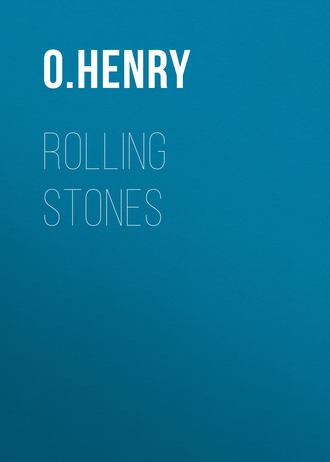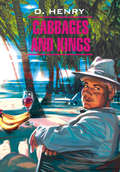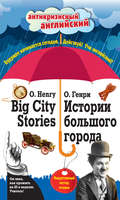
О. Генри
Rolling Stones
THE STORY OF "HOLDING UP A TRAIN"
[In "Sixes and Sevens" there appears an article entitled "Holding Up a Train." Now the facts were given to O. Henry by an old and dear friend who, in his wild avenging youth, had actually held up trains. To-day he is Mr. Al. Jennings, of Oklahoma City, Okla., a prominent attorney. He has permitted the publication of two letters O. Henry wrote him, the first outlining the story as he thought his friend Jennings ought to write it, and the second announcing that, with O. Henry's revision, the manuscript had been accepted.
From W. S. Porter to Al. Jennings, September 21st (year not given but probably 1902).]
Dear Pard:
In regard to that article – I will give you my idea of what is wanted. Say we take for a title "The Art and Humor of the Hold-up" – or something like that. I would suggest that in writing you assume a character. We have got to respect the conventions and delusions of the public to a certain extent. An article written as you would naturally write it would be regarded as a fake and an imposition. Remember that the traditions must be preserved wherever they will not interfere with the truth. Write in as simple, plain and unembellished a style as you know how. Make your sentences short. Put in as much realism and as many facts as possible. Where you want to express an opinion or comment on the matter do it as practically and plainly as you can. Give it life and the vitality of facts.
Now, I will give you a sort of general synopsis of my idea – of course, everything is subject to your own revision and change. The article, we will say, is written by a typical train hoister – one without your education and powers of expression (bouquet) but intelligent enough to convey his ideas from his standpoint– not from John Wanamaker's. Yet, in order to please John, we will have to assume a virtue that we do not possess. Comment on the moral side of the proposition as little as possible. Do not claim that holding up trains is the only business a gentleman would engage in, and, on the contrary, do not depreciate a profession that is really only financiering with spurs on. Describe the facts and details– all that part of the proceedings that the passenger sitting with his hands up in a Pullman looking into the end of a tunnel in the hands of one of the performers does not see. Here is a rough draft of my idea: Begin abruptly, without any philosophizing, with your idea of the best times, places and conditions for the hold-up – compare your opinions of this with those of others – mention some poorly conceived attempts and failures of others, giving your opinion why – as far as possible refer to actual occurrences, and incidents – describe the manner of a hold-up, how many men is best, where they are stationed, how do they generally go into it, nervous? or joking? or solemnly. The details of stopping the train, the duties of each man of the gang – the behavior of the train crew and passengers (here give as many brief odd and humorous incidents as you can think of). Your opinions on going through the passengers, when is it done and when not done. How is the boodle gotten at? How does the express clerk generally take it? Anything done with the mail car? Under what circumstances will a train robber shoot a passenger or a train man– suppose a man refuses to throw up his hands? Queer articles found on passengers (a chance here for some imaginative work) – queer and laughable incidents of any kind. Refer whenever apropos to actual hold-ups and facts concerning them of interest. What could two or three brave and determined passengers do if they were to try? Why don't they try? How long does it take to do the business. Does the train man ever stand in with the hold-up? Best means of getting away – how and when is the money divided. How is it mostly spent. Best way to manœuvre afterward. How to get caught and how not to. Comment on the methods of officials who try to capture. (Here's your chance to get even.)
These ideas are some that occur to me casually. You will, of course, have many far better. I suggest that you make the article anywhere from 4,000 to 6,000 words. Get as much meat in it as you can, and, by the way – stuff it full of western genuine slang – (not the eastern story paper kind). Get all the quaint cowboy expressions and terms of speech you can think of.
Information is what we want, clothed in the peculiar western style of the character we want to present. The main idea is to be natural, direct, and concise.
I hope you will understand what I say. I don't. But try her a whack and send it along as soon as you can, and let's see what we can do. By the way, Mr. "Everybody" pays good prices. I thought I would, when I get your story, put it into the shape my judgment decides upon, and then send both your MS. and mine to the magazine. If he uses mine, we'll whack up shares on the proceeds. If he uses yours, you get the check direct. If he uses neither, we are out only a few stamps.
Sincerely your friend,W. S. P.
[And here is the letter telling his "pard" that the article had been bought by Everybody's Magazine. This is dated Pittsburg, October 24th, obviously the same year:]
Dear Pard:
You're It. I always told you you were a genius. All you need is to succeed in order to make a success.
I enclose pubrs letter which explains itself. When you see your baby in print don't blame me if you find strange ear marks and brands on it. I slashed it and cut it and added lots of stuff that never happened, but I followed your facts and ideas, and that is what made it valuable. I'll think up some other idea for an article and we'll collaborate again some time – eh?
I have all the work I can do, and am selling it right along. Have averaged about $150 per month since August 1st. And yet I don't overwork – don't think I ever will. I commence about 9 a. m. and generally knock off about 4 or 5 p. m.
As soon as check mentioned in letter comes I'll send you your "sheer" of the boodle.
By the way, please keep my nom de plume strictly to yourself. I don't want any one to know, just yet.
Give my big regards to Billy. Reason with him and try to convince him that we believe him to be pure merino and of more than average width. With the kindest remembrances to yourself I remain,
Your friend,W. S. P.
[At this time O. Henry was unknown and thought himself lucky to sell a story at any price.]






